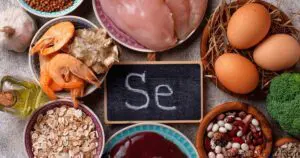 How much vitamin C and what type do you need? While most animals are able to make their own vitamin C from glucose using four liver enzymes to convert it, it does not work like that in humans. Humans are told they need about 75mg/day, which breaks down to about 1.2mg per kilogram of body weight, but when compared to the amounts that animals who cannot make their own vitamin C take in, that value falls very short. Animals that cannot make their own vitamin C, such as wild gorillas and guinea pigs take in an estimated 30mg per kg of body weight (versus 1.2mg/kg in humans). This is a gross underestimation of the human need for vitamin C.
How much vitamin C and what type do you need? While most animals are able to make their own vitamin C from glucose using four liver enzymes to convert it, it does not work like that in humans. Humans are told they need about 75mg/day, which breaks down to about 1.2mg per kilogram of body weight, but when compared to the amounts that animals who cannot make their own vitamin C take in, that value falls very short. Animals that cannot make their own vitamin C, such as wild gorillas and guinea pigs take in an estimated 30mg per kg of body weight (versus 1.2mg/kg in humans). This is a gross underestimation of the human need for vitamin C.
The human recommend daily allowance (RDA) for Vitamin C is more for preventing scurvy, but not for supporting optimal health!
Symptoms of Deficiency
If you experience any of the following symptoms, your body might be hinting at deficiency:
- Dry hair
- Slow wound healing
- Bruise easily
- Dry, rough skin
- Gingivitis and bleeding gums
- Poor immune function
- Frequent nosebleeds
- Scurvy (extreme deficiency)
How Much Vitamin C Do You Need?
How much vitamin C you need depends on a number of factors. While the vitamin C RDA for adults 19 years and older is 75-90 milligrams (mg), 75mg for women and 90mg for men, experts like Dr. Suzanne Humphries claim that is a gross underestimation. She suggests a more ideal minimum RDA would be almost double that, at 125-150mg/day. Please note: you may need even more if you are under chronic stress, drink alcohol, take birth control, or some pharmaceutical drugs, so work with your health advocate to help take these variables into consideration for you.
Pregnancy Needs
Pregnant mothers must get even more in their diet, or risk deficiency. Vitamin C is so important for the fetus, that it will take from the mother even if it means making the mother deficient (one of the reasons a pre-conception diet is so important!) The stress of labor and vaginal delivery use up immense amounts of vitamin C as well. The RDA is 85 mg pregnancy and 120mg for lactating moms, but those values are likely grossly underestimated as well. Dr. Suzanne Humphries notes that pregnant women should be taking at least 500mg/day, although some experts suggest much, much more.
Interesting enough, some studies also suggest that getting enough vitamin C during pregnancy can help prevent neonatal jaundice (source).
Smokers
If you're smoker, you need even more vitamin C. Smoking a single cigarette uses approximately 25mg of vitamin C.
Benefits of vitamin C
There are a variety of benefits that should compel you to take note of your daily intake of vitamin C, namely:
- antioxidant effects
- anti-stress properties
- anti-histamine
- enzyme co-factor for forming collagen, neurotransmitters, hormones, and carnitine
- improves glucose handling
- supports blood vessel health
- cholesterol metabolism
- improved glycemic control
How much vitamin C are you getting per day?
Unless you pay very close attention to your diet and eat plenty of fruits and vegetables year round, your vitamin C intake is likely falling short, especially when you take soil depletion into account.
According to Australian soil scientist Christine Jones, "the vitamin A content of carrots had dropped 99 percent between 1948 and 1991, according to a government analysis, and apples had lost 80 percent of their vitamin C. She went on to say that according to research in England, the mineral content of nearly all vegetables in the United Kingdom had dropped significantly between 1940 and 1990. Copper had been reduced by 76 percent, calcium by 46 percent, iron by 27 percent, magnesium by 24 percent, and potassium by 16 percent. Furthermore, the mineral content of UK meat had dropped significantly over the same period as well—iron by 54 percent, copper by 24 percent, calcium by 41 percent, and so on."
Because of soil depletion, to be safe I think it's best to get vitamin C from food and supplements.
Here are some vitamin C values of common fruits and vegetables:
- 1 kiwi fruit, 64mg
- 1 cup pineapple chunks, 78mg
- 8oz glass organic orange juice, 124mg
- ½ cup strawberries, 50mg
- 1 cup blueberries, 14mg
- 1 medium banana, 10mg
- 1 orange, 69mg
- 1 medium sweet potato, 22mg
- 1 large apple, 10mg
- 1 medium red pepper, 152mg
- ½ grapefruit, 39mg
- 1 cup acorn squash, 22mg
- 1 medium potato, 20mg
- 1 cup chopped broccoli, 81mg
Unfortunately, there's really no way to know that the food you are eating actually contains these said amounts, due to our current soil and agricultural habits.
How to get the more vitamin C with supplements
If you're worried about getting your vitamin C needs from food alone, I'd highly recommend looking into a great supplement. Some of the most popular ingredients to look for include real vitamin C from Camu Camu, rose hips, acerola, and amla. These are some of my favorites:
I'd also recommend having some synthetic vitamin C on hand as well (ascorbate acid) so you can dose even higher when needed (sickness, certain medical conditions, etc.), as it makes getting more vitamin C much easier.
What about you? How do you meet your vitamin C needs?
PIN IT:
References:
- https://ods.od.nih.gov/factsheets/VitaminC-HealthProfessional/
- Dr. Suzanne Humphries via Youtube
- https://www.motherearthnews.com/organic-gardening/essential-nutrients-ze0z1407zcgp?pageid=2#PageContent2







Elaine
I have dehydrated & ground up the peels from organic citrus fruits for vitamin C.
The cheapest method if you cant access the other methods.
Take a tsp or 2 daily when your requirements for C aren't met.
Christi
I take 2000mg of Ester C a day (sometimes more if I'm around crowds), 2 bananas, at least 2-3 apples a day, salad with lots of veggies, snack on different fruits, and take other supps like silica, zinc, and B12. Our bodies fight for us all day, every day. Gotta give it the power to do so!!
Laura
Hi ...! Im' Laura Every day I take 100gm in one vitamin Multi-Vitamin C and another 60gm in other vitamin C in Collagen a day you think I need more.? should I take more and how much?
Jessica
Yes I think you do. Google susan humphries vitamin c Stockholm video and watch it. Very helpful
tumbleweed
Hi, gm = gram there are 1000 mg ( milligrams) in one gm (gram) just an FYI...I'm a fan of Vitamin C and usually keep an envelopes of Emergen-C in my pocket or purse. Each envelope contains 1,000 mg of vitamin c.
Abby
Ascorbate acid is what the body makes! You would need to take a lot of whole food vitamin c to make a real difference and it would be very expensive. I have found many sources of non gmo sodium ascorbate and ascorbate acid. Lynus Pauling recommended ascorbate acid as do many other orthomolecular doctors who study vitamin c.